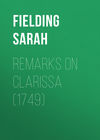Buch lesen: «Remarks on Clarissa (1749)»
SIR, Perhaps an Address of this Nature may appear very unaccountable, and whimsical; when I assure you, my Design is fairly to lay before you all the Criticisms, as far as I can remember them, that I have heard on your History of Clarissa; from the Appearance of the two first Volumes, to the Close of the Work. I have not willingly omitted any one Objection I have heard made to your favourite Character, from her first Appearance in the World; nor, on the contrary, have I either diminished or added to the favourable Construction put on her Words or Actions. If the Grounds for the Objections are found to be deducible from the Story, I would have them remain in their full Force; but if the Answers her Admirers have given to those Objections are found to result from an impartial and attentive perusal of the Story, I would not have her deny'd the Justice they have done her. But tho' I seem here to speak only of Clarissa, as she is your principal Character, yet I intend as well to take notice of what has been said relating to your whole Story, as to her in particular.
In the first Conversation I heard on this Subject, the whole Book was unanimously condemned, without the least Glimpse of Favour from any one present who sat in judgment on it. It was tedious stuff! – low! – Letters wrote between Misses about their Sweet-hearts! – There was an Uncle Anthony – a Brother James! – a Goody Norton! – and a Servant Hannah. – In short, one had no Patience to read it, another could not bear it, a third did not like it, &c. Such general Censurers, I knew, could be very little worth attending to; and this Judgment I should have formed had I been a Stranger to the Book thus unmercifully treated; but as I had read Clarissa, and observed some Beauties in it, yet heard not one of them mentioned, I was determined to say nothing, and to make my Visit as short as possible.
From hence I went to spend the Evening with a Family in whose Conversation I am always agreeably entertained. There happened, that Night, to be a pretty large Assembly of mix'd Company. Clarissa immediately became the Subject of our Conversation, when, after a few general Remarks, one of the Gentlemen said, "His chief Objection was to the Length of it, for that he was certain he could tell the whole Story contained in the two first Volumes in a few Minutes; for Example, (continued he) There is a Family who live in the Country, consisting of an old, positive, gouty Gentleman, two old Batchelors as positive as their gouty Brother, a meek Wife, an ambitious Son, an envious elder Sister, and a handsome younger Sister; who, having refused many offered Matches, engages the Attention and Liking of one Mr. Lovelace, a young Gentleman of a noble Family; her Brother has an absolute Aversion to him; a Rencounter follows between them; the Lady corresponds with Lovelace to prevent farther Mischief; a disagreeable Man is proposed to her by all her Family; she will not consent; they all combine to insist on her Compliance; she is lock'd up; forbid all Correspondence out of the Family, but still persists in her Refusal; they call it Obstinacy; she calls it Resolution; Mr. Lovelace takes the Advantage of her Friends cruel Usage of her, and presses her to throw herself on his Protection: at last, for fear of being forced to marry the Man she hates, she appoints to go off with Lovelace; but fearing the Consequence of such a rash Step, and thinking it a Breach of her Duty to leave her Father's House till urged by the last Necessity, she would have retracted the Appointment, and waited yet a little longer, in hopes her Friends might be influenced to change their Mind; Mr. Lovelace does not take the Letter she puts in the usual Place for that purpose, and we see by her last Letter to her Friend, dated at St. Albans, that she is there with Lovelace. Now, how is it possible for this Story, without being exceeding tedious, to be spun out to two Volumes, containing each above 300 Pages?"
When the Gentleman ceased, a young Lady, whose Name was Gibson, took a little Almanack out of her Pocket, and, turning to the Place where the Births and Deaths of the Kings of England were marked, gave it to the Gentleman, and said, "that by his Rule of Writing, that was the best History of England, and Almanack-makers were the best Historians".
Mr. Johnson, another of the Company, said, he would engage to relate the Roman History, in that manner, in as little time as had been expended in the summing up the Story of Clarissa; and then, with a Monotony in his Voice that expressed more Humour than I can describe, he began as follows:
"Romulus the Son of Apulius, as some say, tho' according to others the Son of Mars by one of the Vestal Virgins, built the City of Rome, and reign'd there 37 Years; after him reigned six Kings successively (their Names are of no Consequence) but the Wickedness of the last King put an end to the regal State, and introduced the Consular, which we may say lasted about the Space of 427 Years, tho' it was retrenched in Power by the Tribunes of the People, and had many Intermissions by the Creation of Dictators, the Decemviri, and the military Tribuns; during all this time, sometimes there was War, sometimes there was Peace, foreign Wars in abundance, great Civil Wars, not a few Contentions for Power amongst all Degrees of Men, vast Conquests, great Extent or Empire, till at last, in the famous Plains of Pharsalia, was fought a decisive Battel for the Empire, between two ambitious Men, namely, Cæsar and Pompey; the latter fled, and was treacherously slain on the Egyptian Shore, whilst the former remain'd Master of the Field, and almost of the Universe."
Here Mr. Johnson changed the Tone of his Voice, and said, "I will pursue this no farther, for to the Death of Pompey makes twenty Volumes in the History wrote by the Fathers Catrou and Rouillé, which is generally allowed to be a very good one, and, I think, one of its chief Beauties depends on the Length; for to that we owe the displaying so many various Characters, and the diving into the Motives of those great Mens Actions, who guided that extensive, powerful, I had almost said unmanagable Common-wealth.
Mr. Singleton laugh'd, and said, "He was surprised to hear a Man of Mr. Johnson's Understanding display so much Eloquence to prove, (if he intended to prove any thing by it) that the knowing the Particulars of the Family at Harlow-place was of as much Consequence, as the knowing the Springs and Wheels on which turned the Affairs of the greatest Commonwealth that was ever heard of since the Creation of the World.
"Indeed, Sir, replied the Lady of the House, (who has bred up three Sons and three Daughters, who do Honour to her Education of them) I really think the penetrating into the Motives that actuate the Persons in a private Family, of much more general use to be known, than those concerning the Management of any Kingdom or Empire whatsoever: The latter, Princes, Governors, and Politicians only can be the better for, whilst every Parent, every Child, every Sister, and every Brother, are concerned in the former, and may take example by such who are in the same Situation with themselves.
Mr. Clark said, "that he believed the whole Account of the Mind of Man, were we only to mention the primary Passions, might be comprised in a few Words; but (continued he) from those Fountains to trace the several Channels into which they flow, and to get a Clue to guide us through all the winding Labyrinths into which they turn themselves, is no such easy Matter; that
Life's but a walking Shadow, a poor Player,
That struts and frets his Hour upon the Stage
And then is heard no more,
perhaps gives us as strong an Image as it is possible to receive, of all the great Transactions perform'd by Mankind for these 6000 Years; and yet the celebrated Author, who wrote those Words, has diversify'd and display'd that strutting and fretting in as many various Lights as he has drawn Characters throughout his immortal Writings.
"In these two Volumes of Clarissa, it plainly appears, the Author's Intention is to impress deeply on the Reader's Mind, the peculiar Character of each Person in that Family whence his Heroine is derived; and in this I think he has succeeded so well, that for my own part I am as intimately acquainted with all the Harlows, as if I had known them from my Infancy; and if I was to receive a Letter from any one of them, I am sure I should not want the Name to assist me in assigning it to the proper Person. Tho', upon the whole, I don't know but there may be some Exuberances that might have been spared, as they stop the Progress of the Story, and keep us in anxious doubt concerning Clarissa's Fate, altho' the scattered Observations have generally the Recommendation of Novelty to amuse the Curious, Depth to engage the Attention of the Considerate, and Sprightliness to entertain the Lively; and Story is considered by the Author, as he says in his Preface, but as the Vehicle to convey the more necessary Instruction. And Clarissa says to Miss How;
You will always have me give you minute Descriptions, nor suffer me to pass by the Air and Manner in which Things are spoken, that are to be taken notice of; rightly observing, that Air and Manner often express more than the accompanying Words.
"If this Observation is just, and Air and Manner can be placed before a Reader's View by writing, I am sure minute Descriptions are necessary; and I could point out several Places in Clarissa, where we may see the very Look of the Eyes, and Turn of the Countenance of the Persons mentioned, and hear the Tone of the Voice of the Person speaking."
The next Objection was raised by Mr. Dobson, to Mrs. Harlowe's Character, which he said, "It was plain you did not intend as a bad one, by her Meekness, Submission to her Husband, and her hitherto truly maternal Care of her Family; and yet, when she joins with violent overbearing Spirits, to oppress and persecute such a Daughter as Clarissa, because she steadily adhered to a Resolution of refusing solemnly to vow at the Altar Love and Obedience to such a Wretch as Solmes, what was this but Tameness and Folly instead of Meekness?"
Totally to justify Mrs. Harlowe was not attempted; on the contrary, it was unanimously agreed, that she was to blame: But Miss Gibson desired "Mrs. Harlow's Faults might not be thrown on the Author, unless it could be proved that he himself intended her Conduct should deserve no Censure. However, (continued she) to preserve any Charity in censuring her, I think it should be considered, how much a Woman must be embarassed, who has for many Years accustomed herself to obey the very Looks of another, where a Point is peremptorily insisted on, which, to comply with, must gall her to the Heart. Mrs. Harlowe might indeed have suffered with Clarissa, but could not have preserved her from her Father's Fury, irritated and inflamed by her ambitious violent Brother: And perhaps she flatter'd herself, that she might gain more Influence by seeming to comply, than if she had attempted absolutely to resist the Storm gathering in her Family. And this I think, the many Hints she gives, that if she was left to herself, it would be otherwise, is a full Proof of."
A young Lady, who had hitherto been silent, looked pleased at Miss Gibson's Remarks, and said;
"I think Clarissa herself has made very good Observations on her Mamma's Meekness, and the Effects of it, in one of her Letters to Miss Howe, where she says – In my Mamma's Case, your Observation is verifyed, that those who will bear much, shall have much to bear. And how true is her farther Observation, where she says, that she fears her Mamma has lost that very Peace which she has sacrificed so much to obtain."
"Your Remark, Madam, said Miss Gibson, is very just, and from this Character of Mrs. Harlowe, we may draw a noble and most useful Moral; for as in the Body, too rich Blood occasions many Diseases, so in the Mind, the very Virtues themselves, if not carefully watched, may produce very hurtful Maladies. Meekness therefore, and a long Habit of Submission, is often accompanied by a want of Resolution, even where Resolution is commendable. To be all Softness, Gentleness and Meekness, and at the same time to be steadily fixed in every Point 'tis improper to give up, is peculiar to Clarissa herself, and a Disposition of Mind judiciously reserved by the Author for his Heroine alone."
An old Gentleman who sat in the Corner, and often made wry Faces at the sudden Attack of Rheumatick Pains, with which he was often afflicted, objected strongly to Mr. Harlowe's arbitrary Usage of such a Wife, as being very unnatural. "Nay, Sir, (said Miss Gibson) I think Clarissa gives a very good Account of Mr. Harlowe's Behaviour, in a Letter to her Friend, when she says;
But my Father was soured by the cruel Distemper I have named, which seized him all at once, in the very prime of Life, in so violent a Manner, as to take from the most active Mind, as HIS was, all Power of Activity, and that in all Appearance for Life. – It imprison'd, as I may say, his lively Spirits in himself and turned the Edge of them against his own Peace, his extraordinary Prosperity adding but to his Impatiency.
"And methinks, it is very easy to imagine, Mr. Harlowe's Pains, and Mrs. Harlowe's tender Concern for these Pains increasing together: her Attention to him, and earnest Endeavours to soften and alleviate the Extremity of his Torments becoming all her Care; till, his Ill-temper daily growing stronger by the Force of his bodily Disorders, he at last habituated himself to vent it on the Person who most patiently submitted, tho' her Heart was most nearly touched and affected by it. And I appeal to the common Experience of any Persons who have accustomed themselves to make Observations on the Scenes before them, if they have not often seen heart-breaking Harshness burst forth on those who strongest feel the Strokes, and yet submit to them without complaining; and this practised even by Persons who would take it much amiss to be thought peculiarly ill-natured."
The old Gentleman, without answering Miss Gibson, insisted on what he had said before; and then turning to his Daughter, in a rough Voice, accompanied with a fierce Look, bid her not sit so idly, but ring the Bell, that the Servant might get a Coach, for he would go home. The young Lady, who was as submissive a Daughter as Mrs. Harlow was a Wife, immediately obeyed his Commands, tho' it might be read in her Countenance, that she could have wished that he would have injoined them in a milder Manner; on which her Father observed, that the Girl was always out of Humour and sullen when she was employed. Indeed, Sir, said the young Lady, I love to be honoured with your Commands; I was only afraid you was angry with me. A Tear stole without her Consent from her Eyes, and at the same Time she looked at her Father with a supplicating, instead of a sullen Countenance.
As soon as the Coach came, the old Gentleman, with great Roughness, commanded his Daughter to attend him, and left us; and we could not help remarking, how much the Gentleman's Behaviour had added Weight to the Force of his Criticism.
The next Objection was raised by Mr. Dellincourt, who found great Fault with the Liberties you have taken with the English Language, and said, you had coined new Words, and printed others as if you was writing a Spelling-book, instead of relating a Story. We were all silent for a few Moments, and then Miss Gibson said;
"Indeed, Sir, I do not pretend to be any Judge of the Accuracy of Stile, but I beg to know, if in the writing familiar Letters, many Liberties are not allowable, which in other kinds of writing might perhaps be justly condemned: And as to the printing some of the Words with Breaks between the Syllables, it certainly makes the Painting the stronger; however, I submit this entirely to the Judgment of others. But supposing this to be a failing, surely it is a trifling one, to censure a Book severely for, in which there are so many striking Beauties to be found. But to illustrate my Thoughts on this Head, I will tell you a Story that is really true.
"A Gentleman shewed a Friend of his a Picture of a favourite Horse, drawn by the celebrated Mr. Wooten. The Horse was unexceptionably beautiful, and the Picture excellently drawn. His Friend regarded it for some Time with great Attention: When the Gentleman (who was a Lover of Pictures, and who delighted to share his Pleasures with others) earnestly asked his Friend's Opinion of the Piece he was viewing; who, after much Consideration, with a significant Shrug of his Shoulders, and a contemptuous Toss of his Hand, said, I don't like the Skirts of the Saddle."











